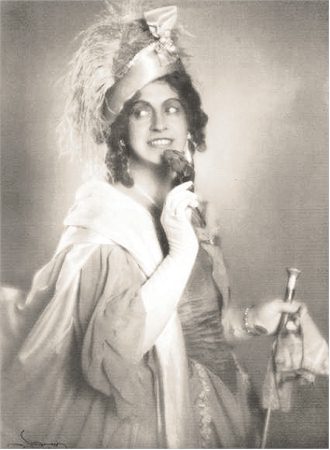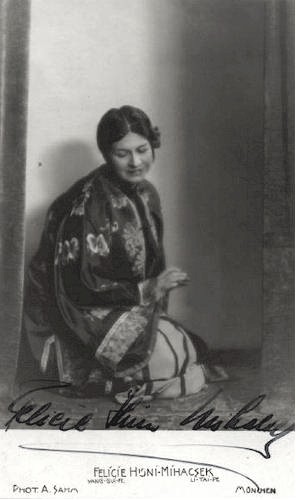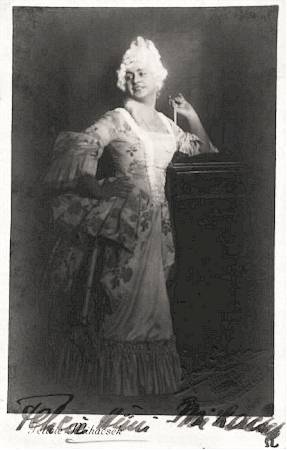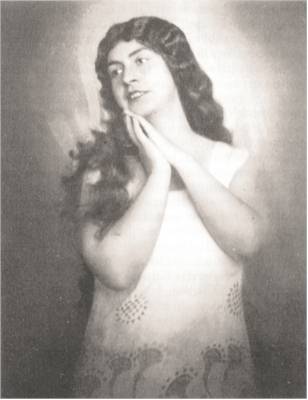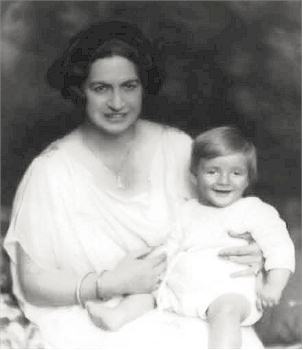Hungarian soprano, 1891 - 1976
In Carl Zeller’s operetta “Der Vogelhändler” (courtesy of Dirk Körschenhausen) Biographical notes: She was born in Pécs (Fünfkirchen) and studied singing at the Vienna Music Academy with the famous teacher Rosa Papier-Paumgartner, former the respected contralto of the Vienna Court Opera. Having finished her studies Hüni-Mihacsek appeared as a guest at the Vienna State Opera in 1919 for the first time, as the First Lady in Die Zauberflöe. After further performances as Helmwige, Woglinde and a Flower Maiden, she officially joined the ensemble the same year. A month later she became the opportunity to sing the Falcon in the world premiere of Strauss’ Die Frau ohne Schatten. Apart from smaller roles during her first season she appeared in big parts such as Micaela, Agathe, Ighino, Dorabella and Elsa (in a new production unter the direction of Richard Strauss). Her second season brought her Sulamith (!) in Goldmark’s Die Königin von Saba, Princess Eudora in Halévy’ s La Juive, Chrysothemis, Naiade in Ariadne auf Naxos and Donna Elvira, again under the baton of Richard Strauss. Mozart was to become her favorite composer throughout her career. The next season saw her as the Countess in Le Nozze di Figaro. It was Berta Kiurina with whom she shared most of her roles in Vienna. In 1922 Hüni-Mihacsek took over most of Kiurina’s roles, singing Marie, Amelia, Antonia, Fiordiligi, Margiana in Cornelius’ Der Barbier von Bagdad, Berthe in Le Prophète, Inès in L’Africaine, Elisabeth and Donna Elvira. Hüni-Mihacsek took part in a number of premieres such as in Hindemith’s Cardillac and Pfitzner’s Das Herz. She even tried the Marschallin, but the role might have come a little early at this stage of her career. After 1932 she appeared fairly often at the Salzburg Festivals. Felicie Hüni-Mihacsek stayed in Vienna until 1925 where she was particularly admired by the direction Richard Strauss-Franz Schalk. Despite her artistic achievements in Vienna she felt strong competion and changed to the Munich State Opera. Here she enjoyed great popularity as one of Munich’s leading sopranos for the next 20 years, enlarging her extensive repertoire by singing Gilda (!), Eva, Sieglinde and Ariadne. She finished her career in 1945 and became a sought-after tutor, giving her farewell appearance in Munich, 1953, as the Marschallin. The artist was married to the Swiss industrialist Alfred Hüni whose name she had adopted early in her career.
(courtesy of Charles B. Mintzer)
(courtesy of Charles B. Mintzer)
As Chrysothemis Comment: Felicie Hüni-Mihacsek was the prima donna of the Munich State Opera for more than 20 years.
Originally a coloratura soprano, she gradually assumed lyric and lyric-dramatic roles. She was generally considered one of the outstanding Mozart sopranos of the inter-war period. When
listening to her recordings, she was at home in many styles. To me, one of the best recordings is her Mrs Ford (Nun eilt herbei). Her singing is witty,
charming and bubbling over with vitality. Another superb record is for instance Konstanze’s “Ach, ich liebte so glücklich”. With the fine German baritone Willi Domgraf-Fassbaender (the father of
Brigitte Fassbaender) she recorded a number of duets. Their rendition of the famous scene Nedda - Silvio from Pagliacci, is performed with ‘realistic vitalità’. Despite the German language
both artists sing with personal approach and dramatic committment to that kind of music.
Felice Hüni-Mihacsek with her son
My warmest thanks to Charles B. Mintzer and Dirk Körschenhausen
|
||||||||||||||||||||||||||||
